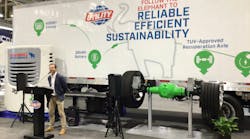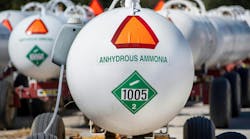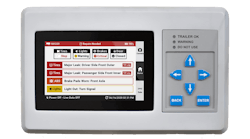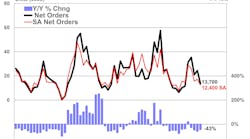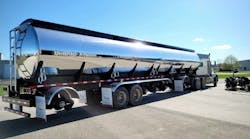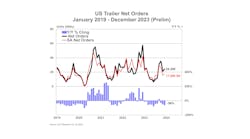Don Reynolds, president of 21st Century Forecasting and an internationally known professional futurist, painted a dour picture when he spoke at TTMA last year — even more dour than the picture painted by various economists who spoke at industry trade shows throughout the year.
And he was on target.
As he spoke at this year's convention, he said that there was a “lot of human misery going on” in the US, with bank robberies up 35%, food-stamp applications up 46%, and pawn-shop activity up 32%.
The economic meltdown had truly become a “global event,” he said, with China's industrial production down 23%, Korea's industrial production down 38%, and German exports down 19%.
“I'm not afraid to deliver bad news,” he said of his reputation.
However, the news this time was not as bad. He said he is “probably more positive today than I've been in the past 18 months.”
“Here comes the good news: I think the headlines start to change by December,” he said. “I'm not going to tell you that the patient is still not sick. But by December, the bleeding will have stopped.
“To a large extent, you (in the trailer industry) are dependent on the economic health of the country. And the country's economic health is, to a large extent, controlled by economic willingness to spend money by the consumer. If consumers are spending more, this is good. It's slowly beginning to come together. When do things get better? When do we get back to where we were? I'm not sure you get back to where you were. Remember, this whole economic system we built is floating on a sea of debt — or what they call leverage — and you have to reduce your leverage at some point. I think we turn positive by the end of year and muddle through 2010 at 1-2% GDP growth. By 2011, we're back to decent numbers.”
Money disappeared
Reynolds said the $22 trillion residential real estate market declined by 25%, so $5 trillion of home equity was wiped out. The Dow Jones went from 14,000 to 8,000, wiping out another $5 trillion. The banking system lost $2 trillion worth of equity, which is $20 trillion worth of lending. That's $30 trillion that disappeared from the economy in a year.
He said we're sick, and it's similar to a doctor saying, “You must take your antibiotic for 10 days. Do not stop or you will be even worse than before.”
“There was $6 trillion worth of stimulus,” he said. “It takes six months before it starts its impact, and a year before it's at full strength. Most of this started in September or October. The stimulus has barely started in the economy and probably won't impact it until this fall. The point is, the medicine has been administered. As long as the patient continues to take his medicine … But there is a danger in this process: We're going to get some nice numbers, and somebody's going to say, ‘The crisis is over. We don't need any more stimulus.’ Wrong. You do.
“On top of that $6 trillion, there are $6 trillion in money-market funds sitting out there, earning essentially nothing. That was fine three months ago, because then you're whole attitude was, ‘I don't care about a return on capital. I just want a return of capital.’ But now you're sitting there with $6 trillion earning nothing for six months, and you're thinking, ‘It'd be nice to earn something on it. Maybe I need to start investing again.’ I've got $6 trillion of government stimulus and $6 trillion worth of money-market stimulus here. Combine it and you've got $12 trillion worth of stimulus. Ladies and gentlemen, that's called recovery.”
Liberal versus socialist
Reynolds said that although he didn't vote for President Obama, he is “in awe” of him because he's a “tremendously powerful figure and incredibly well-spoken” and has chosen a “very good economic team.”
But then he launched into an attack of President Obama's ideology.
“Now there is all this talk that we elected this liberal president,” he said. “I wish we would quit calling President Obama a liberal and call him what he really is: a socialist.”
There was a smattering of applause, which prompted Reynolds to note that he got a standing ovation from the Texas Cattle Ranchers Association for saying the same thing.
“The problem I see with this president and this country is that we are truly in a generational turning point,” he said “We are in the 21st century and we elected a 21st-century president. And he has 21st-century problems. And between nationalizing banks and buying an automobile company and getting ready to socialize medicine, we have reached a tipping point between a capitalist country and a socialist country. The polls tell us that 57% describe themselves as capitalists, 20% as socialists, and the rest don't know.
“We've sort of developed a mentality. Some would call it a populist mentality, but we will call it simply, ‘Get the rich,’ or ‘Punish the rich.’ The problem is, their definition of rich is any family unit in this country that makes more than $100,000 a year. And if you make more than $250,000, you definitely are going to be penalized.
“His health-care plan says that if you are uninsurable or have no insurance, you can get cheap government insurance. And that way, everybody in the country will have insurance. Hospitals looked around and said, ‘This ain't bad, because we have a lot of indigent health care.’ Companies said, ‘This ain't bad, because we're spending a lot of money on health-care benefits for our employees.’ Some of you running your own companies said, ‘Well, if government takes it over, I don't have to pay their health-care benefits.’ If you're in private insurance, how do you compete with that? At some point, all private insurers will be squeezed out, except the handful that caters to the truly rich.
“There's a correlation between his health-care plan and the ‘cap and trade.’ That says that we are going to limit your carbon emissions, and if you want more, you have to buy someone else's right to carbon emissions. In effect, it becomes a carbon tax. The president's health care is going to need $750 billion this year. ‘Cap and trade’ is a tax on energy, it's a tax on the utility companies, and that will be passed on to consumers. ‘Cap and trade’ will generate $750 billion. I submit to you that the chances of the president getting his health-care plan approved are a lot better if he gets ‘cap and trade’ approved.”
